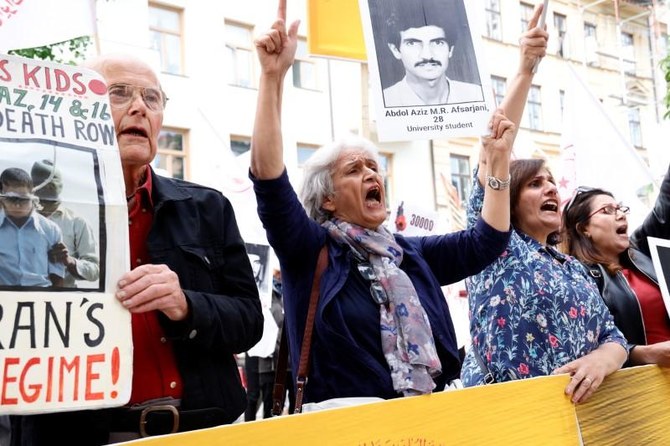STOCKHOLM: The trial in Sweden of a former Iranian prison official, accused of handing out death sentences as part of a 1988 purge of dissidents, will relocate to Albania on Wednesday to hear two weeks of testimony.
Hamid Noury, 60, has been on trial in Stockholm’s district court since August on a slew of charges including murder, crimes against humanity and war crimes, dating from July 30 to August 16, 1988, when Noury was allegedly assistant to the deputy prosecutor of Gohardasht prison in Karaj, near Tehran.
The entire Stockholm district court is relocating to Durres, Albania, at the prosecution’s request, to hear testimony from November 10 to 18 from seven witnesses “who are unable to travel to Sweden,” court clerk Anna Wester told AFP.
The seven are members of the People’s Mujahedin of Iran (MEK), the exiled opposition group, who reside in a camp near Durres.
Noury himself will however remain in Stockholm, Wester said.
He has been held in custody since November 2019, when he arrived in Sweden where he has family members.
He had been lured to the Scandinavian country by justice campaigner and former political prisoner Iraj Mesdaghi with the promise of a luxury cruise.
Human rights groups have estimated that 5,000 prisoners were killed across Iran, allegedly under the orders of supreme leader Ayatollah Khomeini in reprisal for attacks carried out by the MEK at the end of the Iran-Iraq war of 1980-88.
While not accused of directly carrying out any of the killings, the prosecution has alleged that Noury’s participation included handing down death sentences, bringing prisoners to the execution chamber and helping prosecutors gather prisoners’ names.
Noury has refuted the charges against him. He is due to testify in Stockholm as of November 23.
Sweden’s principle of universal jurisdiction means that its courts can try a person on serious charges such as murder or war crimes regardless of where the alleged offenses took place.
A verdict in the case is expected in April 2022.
Iranian ex-official’s warcrimes trial moves to Albania
https://arab.news/5wccq
Iranian ex-official’s warcrimes trial moves to Albania

- Hamid Noury, 60, has been on trial in Stockholm’s district court since August on a slew of charges including murder, crimes against humanity and war crimes
- The entire Stockholm district court is relocating to Durres, Albania, at the prosecution’s request, to hear testimony from November 10 to 18 from seven MEK witnesses
EU should consider forming combined military force: defense chief

- Kubilius floated creating a “powerful, standing ‘European military force’ of 100,000 troops” that could eventually replace US forces
- Trump has heightened fears among NATO allies over Washington’s reliability by insisting he wants to take over Greenland
BRUSSELS: EU countries should weigh whether to set up a combined military force that could eventually replace US troops in Europe, the bloc’s defense chief said Sunday.
EU defense commissioner Andrius Kubilius floated creating a “powerful, standing ‘European military force’ of 100,000 troops” as a possible option to better protect the continent.
“How will we replace the 100,000-strong American standing military force, which is the back-bone military force in Europe?” he asked in a speech in Sweden.
The suggestion comes as US President Donald Trump has heightened fears among NATO allies over Washington’s reliability by insisting he wants to take over Greenland.
Worries over Trump’s commitment to Europe have already spurred countries to step up efforts to bolster their militaries in the face of the threat posed by Russia.
Ideas about establishing a central European army have floated around for years but have largely failed to gain traction as nations are wary of relinquishing control over their militaries.
The US has pushed its European allies to increasingly take over responsibility for their own security, and raised the prospect it could shift forces from Europe to focus on China.
“In such times, we should not run away from the most pressing questions on our institutional defense readiness,” said Kubilius, a former Lithuanian prime minister.
In his speech Kubilius also advocated for the creation of a “European Security Council” of key powers — including potentially Britain — that could help the continent take decisions over its own defense quicker.
“The European Security Council could be composed of key permanent members, along with several rotational members,” he said.
“In total around 10-12 members, with the task to discuss the most important issues in defense.”
He said the first focus of such a body should be trying to change the dynamics in the war in Ukraine to ensure that Kyiv does not end up losing.
“We need to have a clear answer — how is the EU going to change that scenario?,” he said.
“This is the reason why we need to have a European Security Council now!“













